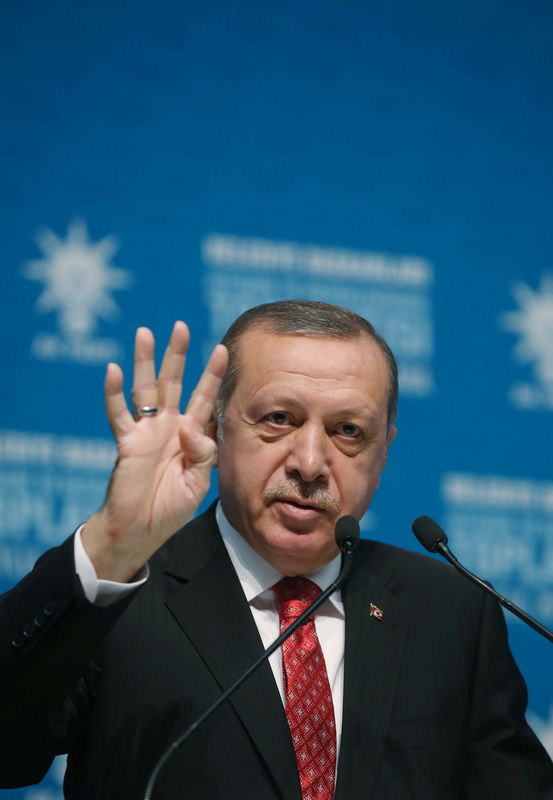By Tuvan Gumrukcu and Ece Toksabay
ANKARA (Reuters) - President Tayyip Erdogan on Wednesday dismissed NATO allies' concern over Turkey's deal to buy a missile defence system from Russia and said Ankara would continue to take the security measures it thought right.
Turkey, whose relations with its allies have frayed in recent months, said it opted for the S-400 because Western companies had offered no "financially effective" alternative. But NATO officials have voiced disquiet over the purchase of missiles incompatible with alliance systems.
"They went crazy because we made the S-400 agreement. What were we supposed to do, wait for you? We are taking and will take all our measures on the security front," Erdogan said in a speech in Ankara.
Western firms which had bid for the contract included U.S. firm Raytheon (RTN.N), which put in an offer with its Patriot missile defence system. Franco-Italian group Eurosam, owned by the multinational European missile maker MBDA and France’s Thales TCFP.PA, came second in the tender.
Turkey, with the second-largest army in the alliance, has enormous strategic importance for NATO, abutting as it does Syria, Iraq and Iran. But the relationship has become fractious.
Erdogan has been infuriated by Washington's support for Kurdish YPG fighters in the battle against Islamic State in Syria. Turkey sees the YPG as an extension of the militant Kurdistan Workers Party (PKK), which has waged a three-decade insurgency in Turkey's largely Kurdish southeast.
GERMAN CRITICISM
The U.S. Pentagon said it had expressed concerns to Ankara about the Russian purchase.
"A NATO interoperable missile defence system remains the best option to defend Turkey from the full range of threats in its region," spokesman Johnny Michael said in a statement.
France, however, said Turkey's decision was a sovereign choice which did not require comment from NATO allies. France's foreign minister is due to visit Turkey on Thursday.
Germany has said it would restrict some arms sales to Turkey, reflecting the diplomatic strain over a security crackdown in Turkey following a failed military coup last year.
Berlin had originally sought to freeze major arms sales, but scaled that back after Turkey said that would harm the joint fight against Islamic State.
Berlin has criticised mass arrests that followed the failed coup and demanded the release of around a dozen German or Turkish-German citizens arrested in recent months.
Turkey originally awarded a $3.4 billion contract for the defence system to China in 2013, but cancelled that two years later, saying it would concentrate on developing a system domestically.
Turkey later began talks with Russia, and in July Erdogan said the deal had been signed, although negotiations appear to have been drawn out over financing.
Turkish media quoted Erdogan this week as saying he and Russian President Vladimir Putin were determined that the agreement should proceed.

.